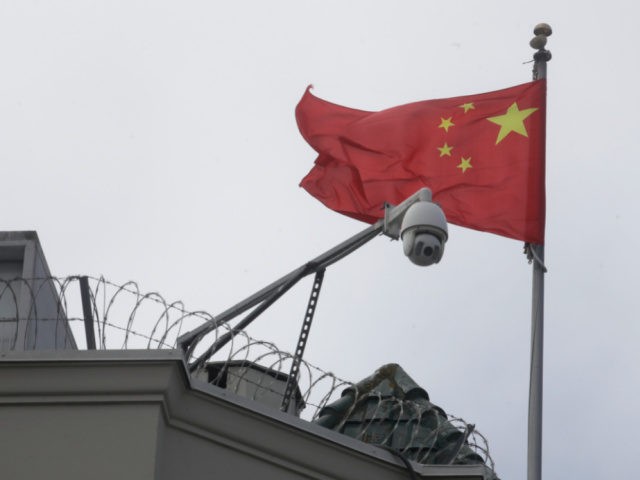Democrats introduced a bill on Wednesday to increase funding for semiconductor research to institutions vulnerable to Chinese espionage, an attempt to regain momentum after the failure of the “Build Back Better” agenda.
The bill, dubbed the America COMPETES Act, is designed to fund high-tech research at academic institutions focused on the semiconductor industry.
The United States and Communist China both rely on Taiwan for manufacturing semiconductors. The independent nation near China manufactures 92 percent of the world’s semiconductors that Silicon Valley utilizes for American innovation.
Democrats on Tuesday claimed the COMPETES Act will “turbocharge our research capacity to lead the technologies of the future, and advance our global competitiveness, while supporting strong labor standards and human rights, among other key provisions.”
In section 10111 of the bill, it states the legislation will support the “development of universities’ workforces that foster collaboration between K-12 students, university students, early-career researchers, faculty, and national laboratories.”
Critics of the legislation believe it lacks safeguards against Chinese espionage. “President Biden is telling U.S. research centers, corporations, and colleges not to worry about Chinese espionage,” Vice Chairman of the Select Committee on Intelligence Marco Rubio stated after the release of the bill.
“The Chinese Communist Party sees this, and it emboldens them to do even more. Steal more secrets. Steal more technology. Steal more American jobs,” Rubio added. “This dangerous behavior jeopardizes our national security.”
Former Secretary of State Mike Pompeo told Breitbart News in 2020 that Communist China’s influence in the United States universities is a “serious matter”:
You talked about our universities and our research labs. This is not about good Chinese people working on commercial projects. We find that acceptable. This is about the Chinese Communist Party exerting its influence here in the United States for missions that are deeply connected to the regime in China trying to exert influence in places where it ought not to be, and we’re doing everything we can to push back against that.
Though Democrats have objected to Republicans’ contentions and have continued to position the bill as an “anti-China” piece of legislation, a pattern of Chinese espionage at American universities throughout recent years is apparent.
Below is a list of professors charged with crimes related to Communist China. Some individuals were convicted and others were found not guilty:
- January 2022, MIT, Gang Chen
A professor of mechanical engineering at the Massachusetts Institute of Technology was charged with failing to disclose “Chinese affiliations in grant proposals to U.S. funding agencies.” Federal prosecutors dropped the charges because they could not “meet its burden of proof at trial.”
- December 2021, Harvard, Charles Lieber
The former Chair of Harvard University’s Chemistry and Chemical Biology Department, Charles Lieber, was convicted in December of 2021 for lying about his connection to Communist China’s Thousand Talents Program and the Wuhan University of Technology (WUT) in Wuhan, China. Lieber also failed to report income he received from WUT.
- July 2021, UCLA, Yi-Chi Shih
Professor of electrical engineering Yi-Chi Shih was convicted in “a scheme to illegally export integrated circuits with military applications to China the required filing of electronic export information,” the Justice Department announced in July of 2021. Shih was sentenced to serve more than five years in prison, pay $362,698 in restitution to the IRS, and fined $300,000.
- June 2021, University of Tennessee, Anming Hu
Associate professor Xiaoxing Xi in the department of mechanical, aerospace and biomedical engineering at the University of Tennessee was charged with three counts of wire fraud and three counts of making false statements. Xi was later found not guilty and the university offered to reinstate him in October of 2021.
- April 2021, Temple University, Xiaoxing Xi
Associate professor Xiaoxing Xi in the department of mechanical, aerospace and biomedical engineering at the University of Temple was “accused in 2015 of stealing sensitive technology involving his research,” the Associated Press reported. “Charges were dropped when investigators realized the information shared did not amount to trade secrets.”
- February 2021, Stanford, Chen Song
Researcher of brain disease Chen Song was charged in February 0f 2021 with visa fraud, obstruction of justice, destruction of documents, and false statements in connection with a scheme to conceal and lie about her status as a member of the People’s Republic of China’s military forces while in the United States, according to the Justice Department. It appears this case is ongoing.
- August 2020, Texas A&M, Zhengdong Cheng
NASA researcher Zhengdong Cheng, who worked on U.S. space projects, was charged in August of 2020 with conspiracy, making false statements, and wire fraud. According to the Justice Department, Cheng “willfully took steps to obscure his affiliations and collaboration with a Chinese University and at least one Chinese-owned company.” It appears this case is ongoing.
Editor’s Note: At the time of this article’s publication, several mentions of the COMPETES Act incorrectly referred to a different bill. These errors have been updated and corrected.

COMMENTS
Please let us know if you're having issues with commenting.